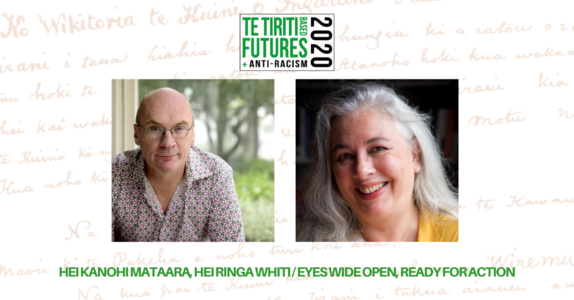WEBINAR: Owning Our History: New Zealand Wars
.png)
🌱 Kaikōrero / Speakers: Vincent O'Malley + Joanna Kidman
🌱 Ringa hāpai / Chair: Susan Healy
When Ōtorohanga College pupils petitioned Parliament in 2015, calling for a national day of commemoration for the New Zealand Wars, they sparked a vital debate about memory, identity and history.
How do New Zealanders remember and forget difficult events in our colonial past? Why are some conflicts publicly remembered while others are forgotten or overlooked? And who decides?
Now that New Zealand history will be taught in all schools from 2022, these questions become vitally important.
We argue that iwi and hapū need to be at the forefront of conversations around this new curriculum and that connecting with mana whenua histories will empower rangatahi to better understand the places they call home.
★ VINCENT O'MALLEY ★
HistoryWorks
Vincent O’Malley is a founding partner of HistoryWorks, a group of historians specialising in Treaty of Waitangi research. He is the author of a number of books on New Zealand history, including The Meeting Place: Māori and Pākehā Encounters, 1642–1840 (Auckland University Press, 2012), and his landmark book on the Waikato War, The Great War for New Zealand: Waikato 1800-2000, published by Bridget Williams Books in 2016.
His most recent book is the best-selling The New Zealand Wars/Ngā Pakanga o Aotearoa (2019).
He is co-Principal Investigator for the Marsden Fund-supported project, He Taonga te Wareware? Remembering and Forgetting Difficult Histories in Aotearoa/New Zealand. The project focuses on issues of identity and memory arising out of the nineteenth century New Zealand Wars.
It examines how tribal memories about these histories are passed on to younger generations within hapū and iwi and how the nation’s violent colonial past was transformed in public memory; how official state accounts of these events changed over time and why some episodes were collectively forgotten or overlooked.
★ JOANNA KIDMAN ★
Ngāti Maniapoto, Ngāto Raukawa
Joanna Kidman is a sociologist who works with Māori youth living in precarious economic circumstances in a wide range of urban, municipal and rural settings.
Over the past 25 years, she has investigated the impact of institutional and systemic racism on Māori young people and their whānau. Her main focus is the ongoing impact of colonialism and associated state policies and practices linked to income poverty, high incarceration rates, and poor educational outcomes for Māori.
She is particularly interested in working alongside Māori communities that are actively rebuilding tribal futures for taiohi Māori.
On the day of, go to this link: https://zoom.us/j/468316821
🌱 Ringa hāpai / Chair: Susan Healy
When Ōtorohanga College pupils petitioned Parliament in 2015, calling for a national day of commemoration for the New Zealand Wars, they sparked a vital debate about memory, identity and history.
How do New Zealanders remember and forget difficult events in our colonial past? Why are some conflicts publicly remembered while others are forgotten or overlooked? And who decides?
Now that New Zealand history will be taught in all schools from 2022, these questions become vitally important.
We argue that iwi and hapū need to be at the forefront of conversations around this new curriculum and that connecting with mana whenua histories will empower rangatahi to better understand the places they call home.
★ VINCENT O'MALLEY ★
HistoryWorks
Vincent O’Malley is a founding partner of HistoryWorks, a group of historians specialising in Treaty of Waitangi research. He is the author of a number of books on New Zealand history, including The Meeting Place: Māori and Pākehā Encounters, 1642–1840 (Auckland University Press, 2012), and his landmark book on the Waikato War, The Great War for New Zealand: Waikato 1800-2000, published by Bridget Williams Books in 2016.
His most recent book is the best-selling The New Zealand Wars/Ngā Pakanga o Aotearoa (2019).
He is co-Principal Investigator for the Marsden Fund-supported project, He Taonga te Wareware? Remembering and Forgetting Difficult Histories in Aotearoa/New Zealand. The project focuses on issues of identity and memory arising out of the nineteenth century New Zealand Wars.
It examines how tribal memories about these histories are passed on to younger generations within hapū and iwi and how the nation’s violent colonial past was transformed in public memory; how official state accounts of these events changed over time and why some episodes were collectively forgotten or overlooked.
★ JOANNA KIDMAN ★
Ngāti Maniapoto, Ngāto Raukawa
Joanna Kidman is a sociologist who works with Māori youth living in precarious economic circumstances in a wide range of urban, municipal and rural settings.
Over the past 25 years, she has investigated the impact of institutional and systemic racism on Māori young people and their whānau. Her main focus is the ongoing impact of colonialism and associated state policies and practices linked to income poverty, high incarceration rates, and poor educational outcomes for Māori.
She is particularly interested in working alongside Māori communities that are actively rebuilding tribal futures for taiohi Māori.
On the day of, go to this link: https://zoom.us/j/468316821
525
Attendees
Starts on
Sunday, 22 March 2020 at 12:00 PM NZDT
Ends on
Sunday, 22 March 2020 at 1:00 PM NZDT

